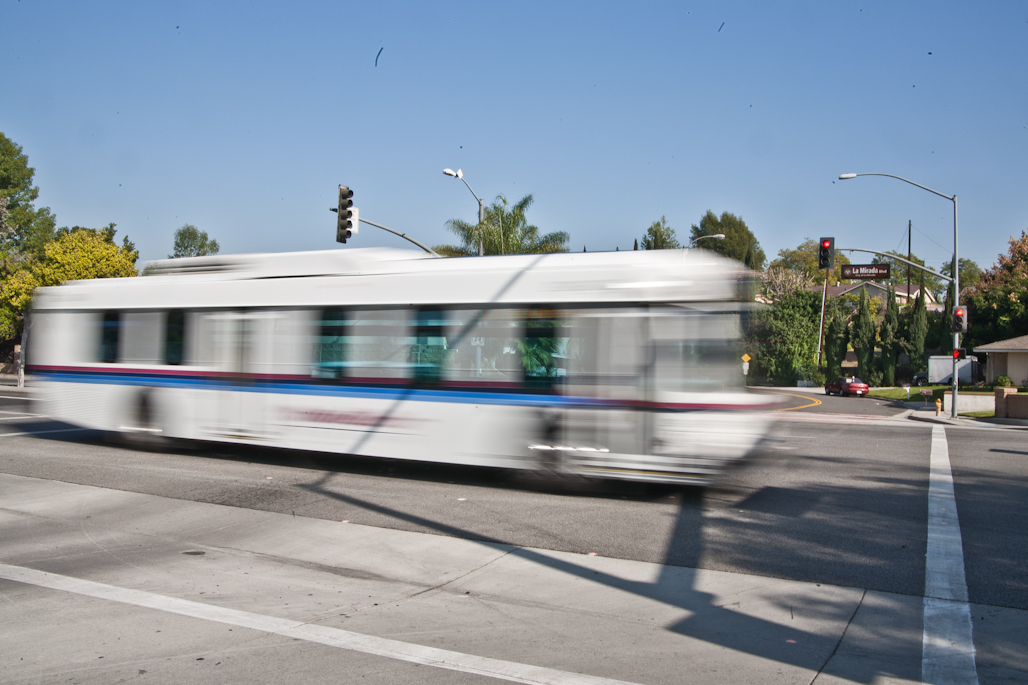
Students may soon have another transit option, as Biola makes plans to open a student-exclusive shuttle system. | Photo courtesy of Mike Villa.
President Barry Corey is discussing moving forward with the plan of implementing a free shuttle bus service for students with Don Sims, senior director for auxiliary services, after a 10-year on and off discussion. The shuttle bus proposal resurfaced in the Sept. 6 Associated Students senate meeting, and if passed, will be a free service available to Biola students in spring 2012.
Sims explained it would allow students to get off campus for the weekend without having to worry about gas money.
“The main goal is to provide a service to students that might encourage families to say, ‘My son or daughter doesn’t need to bring a car.’ It will benefit students to allow them to get around locally without having to ask for a ride,” Sims said.
The bus would be a free service with students only needing their ID card. The routes would be available Thursday through Sunday and would be driven by a Biola employee. The shuttle bus would likely leave from a designated location on campus and students will be able to view the destinations from a schedule, which would possibly be located online.
Administration seeks student feedback
Final plans to actualize the shuttle bus program are still in the works. Meanwhile, Sims has asked AS to obtain student feedback, expressing how imperative this is for the plan to be set in motion and be successful since it is for the benefit of students.
“I briefed the senators on the overall plan and how Mr. Sims had approached me about wanting feedback,” said AS senior vice president junior Janine Marderian.
Marderian told senators to keep in mind the students’ different years as freshmen may have a different opinion than seniors. Additionally, she wanted them to find if they already had transportation while conducting surveys.
Mixed reactions to proposed shuttle service
Marderian explained that they are still receiving feedback, as senators have only been conducting the survey for about a week, but overall it received positive feedback and students liked the idea of not having to use their gas.
“Lowerclassmen without cars thought it was a wonderful idea and upperclassmen who have cars felt it wasn’t as applicable to them,” Marderian said.
However, there are always exceptions. Senior Erin Bretthauer is one upperclassman who said she would love a shuttle bus.
“I haven’t had a car the entire time I have been in school, so it will be really interesting to be able to get off campus,” Bretthauer said.
Sophomore Allison Cates also appreciates the idea of the service.
“I think that it would be good for incoming students that don’t have cars, because it would allow them the opportunity to get more involved with the community. It would also help those who can’t really afford to pay for gas,” Cates said.
University to fund shuttle, not students
AS senators were asked questions about where the funding was coming from when conducting the surveys. Marderian clarified that it is being funded by the university and is not coming out of the student contingency.
“Auxiliary Services department will fund the program. Tuition dollars will not be used. Estimated cost based upon running the shuttle 10 hours per day for 4 days a week is an $80,000 annual cost. This includes maintenance, insurance, salaries, fuel, etc.” Sims, said. Marderian had expressed that students were glad to hear it was not coming out of AS. She further explained by saying that students were glad because they knew AS had already many events planned.
“Based off who we have talked to, it seems like it could be really beneficial to a lot of people and maybe alleviate some of the parking problems because people wouldn’t feel they need to bring a car to campus,” Marderian said.







